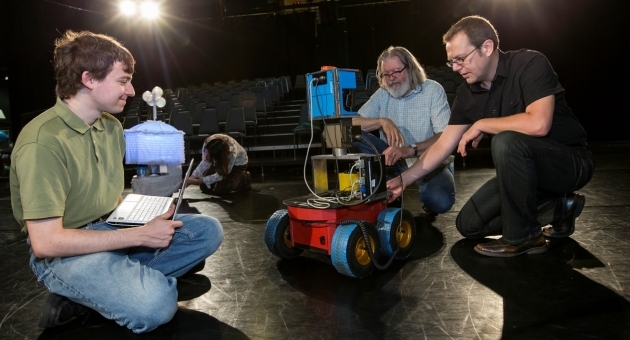Rolf Lakaemper creates an atmosphere of trust in the classroom

If a student burst into their office upset about classwork and shouting profanities, most new faculty members would have reacted a bit differently than Computer and Information Science Associate Professor Rolf Lakaemper.
Lakaemper, who at the time had been at Temple for just a month, did not call security or have the student removed. Instead he asked the student to sit and “reword his emotions.” He then apologized to the student, and when the student did the same, Lakaemper accepted.
“I thought that if this student has the guts to do this, he must really be upset, but he must also be very serious about wanting to learn,” recalled Lakaemper, who is a recipient of Temple’s 2013–2014 Christian R. and Mary F. Lindback Award for Distinguished Teaching. “He was bright and intelligent but just needed someone to give him some extra help.”
“He wound up coming to my office every single day,” said Lakaemper, who joined Temple’s computer and information sciences faculty in 2003. “It was an instance where a teacher, instead of distancing themselves, just listened and created an atmosphere of trust.”
Creating an atmosphere of trust with his students is one of the core principles that guides Lakaemper in his teaching.
“Students learn to hide what they can’t do, but what I want them to do is focus on what they can do,” he said. “This atmosphere of trust means they can say, ‘Hey, I have absolutely no idea what you’re talking about. I understand everything else, but here is this thing that I really don’t understand.’”
Lakaemper said he tries to move students’ focus away from grades and attempts to challenge, motivate and excite them through individual projects they are assigned in class.
“Myself, I don’t really care about their grades; it is about the skills that students learn,” he said. “The students generally realize this very early in my class.”
Lakaemper often brings projects from his own research in robot navigation, computer vision, and computer graphics and games into the classroom so students can develop hands-on experience with real-world problems.
“It is very nice and quite easy to bring my research topics into the classroom and explain what I’m doing and present them with a skill set that they can master,” said Lakaemper. “I tell the student, ‘This is now your project; I will support you to finish this by yourself, but it's for you. If you’re not excited about this project, just tell me and together we’ll pick another challenge.’”
Lakaemper, who has also been recipient of the Steven Petchon Distinguished Excellence in Teaching Award from the College of Science and Technology and the Outstanding Teaching Award from the Temple Association for Computing Machinery, said he feels extremely honored to receive the Lindback Award.
“Temple values teaching,” he said. "To receive an award like this makes me feel really appreciated.”